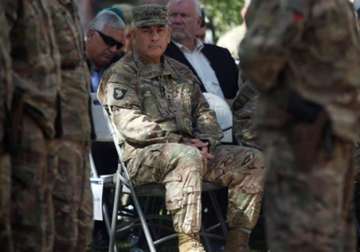Air strike on Afghanistan's Kunduz hospital a mistake: Top US commander
Washington: The deadly American attack on a hospital in northern Afghanistan occurred despite "rigorous" US military procedures designed to avoid such mistakes, the top commander of US and allied forces in Afghanistan said on Tuesday.Gen

Washington: The deadly American attack on a hospital in northern Afghanistan occurred despite "rigorous" US military procedures designed to avoid such mistakes, the top commander of US and allied forces in Afghanistan said on Tuesday.
Gen John F Campbell also told a Senate committee that he thinks President Barack Obama should revise the current plan to reduce the US force in Afghanistan at the end of 2016. The plan calls for cutting the force from 9,800 to about 1,000 embassy-based security.
Campbell said he had provided his superiors with several options because conditions in Afghanistan have changed significantly since Obama approved that troop-cut plan in 2014.
Testifying three days after the medical clinic strike that killed at least 22 people, Campbell said Afghan forces requested air support on Saturday while engaged in combat with Taliban fighters in the city of Kunduz, communicating with US special operations troops at the scene. Those US forces were in contact with the AC-130 gunship that fired on the medical clinic run by Doctors Without Borders (also known by its French name Medecins Sans Frontieres or its abbreviation MSF), he added.
Also Read: Afghan hospital bombing: Toll rises to 22
"To be clear, the decision to provide (air strikes) was a US decision, made within the US chain of command," Campbell said. "The hospital was mistakenly struck. We would never intentionally target a protected medical facility."
In his appearance before the Senate armed services committee, Campbell said he could not provide more details about what happened, including who may have failed to follow procedures for avoiding attacks on hospitals. He said he must await the outcome of multiple investigations. Campbell had disclosed on Monday that the attack had been requested by Afghan troops.
Anti-war protesters sat in the front row of Tuesday's hearing with red coloring, depicting blood, on their faces. They carried signs that read: "Healthcare not warfare," and "Kunduz victims: RIP." A woman who shouted "Bombing hospitals is a war crime! Stop the bombing now!" was escorted from the room. The chairman, senator John McCain, R-Arizona, warned that those interfering with the hearing risked arrest.
On troop levels, Campbell said the ability to train Afghan forces and conduct counterterrorism operations would be restricted if the number of US troops were to drop to 1,000 by the end of next year.
"If you go to just embassy only, our ability to do TAA (train, advise and assist) is very limited. Our ability to do CT (counterterror operations) is much more limited," Campbell said. He said the different options that he has provided to his superiors are for troop levels beyond a normal embassy presence.
Asked if he thought the president should review his plan, Campbell said "Yes, sir."
Defence secretary Ash Carter said Monday the Pentagon is providing options to the White House and Obama will be making decisions about future force levels later this fall.
Campbell has said the air strike, now under investigation, was requested by Afghan forces who reported being under Taliban fire. It's unclear whether the clinic was targeted in error or whether US military personnel followed procedure. They are required to verify that the target of a requested air strike is valid before firing.
Christopher Stokes, general director of Doctors Without Borders, has said "there can be no justification for this horrible attack" and that it was critical to conduct "a full transparent independent investigation."
Kunduz has been the scene of heavy fighting in recent days.
A Taliban assault on Kunduz took Afghan authorities by surprise and embarrassed President Ashraf Ghani's administration. The Taliban, who attacked on multiple fronts, held the city for three days before a government counteroffensive began. Afghan forces have retaken Kunduz, an important city on the Tajikistan border, a hub for drug and gun smuggling to and from Central Asian countries.